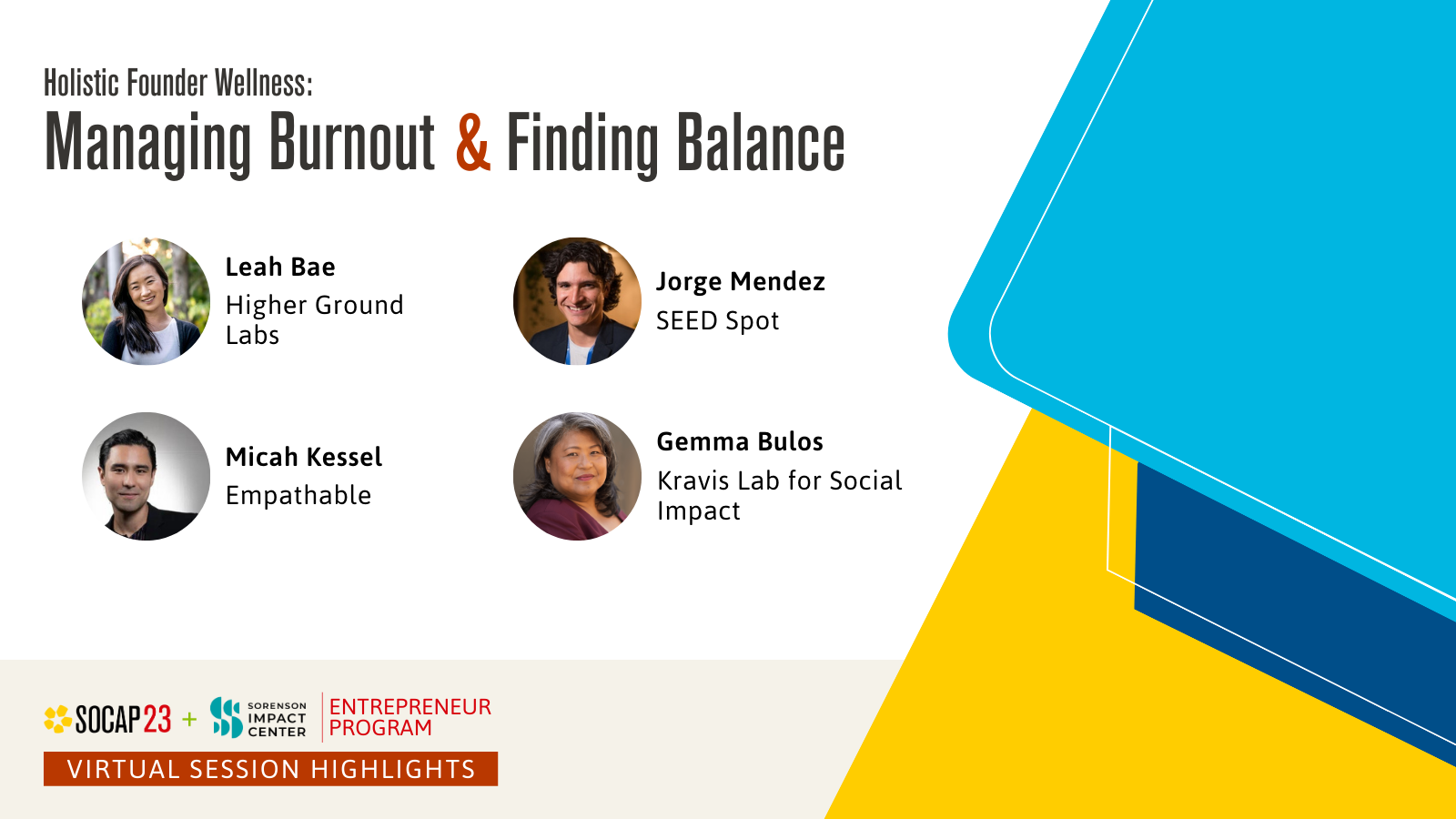Social entrepreneurs are tackling some of the world’s big challenges through their everyday work. They also can face individual challenges related to burnout and imposter syndrome that can be eased by holistic wellness practices. These include strategies to help founders balance their day-to-day business tasks with personal priorities.
This year’s SOCAP23 Entrepreneur Program includes six monthly strategy tracks — including April’s session on holistic wellness — to help founders enhance their impact and develop a nurturing framework for their businesses. The virtual sessions are facilitated by a variety of subject matter experts. We’re grateful for the knowledge, time, and guidance they are sharing with the founders and the broader SOCAP community. Find highlights and takeaways from the April session below, and watch for additional sessions in the months leading up to SOCAP23.
At SOCAP23, you can hear from the SOCAP23 Entrepreneur Program cohort when they present on stage about the unique challenges their companies are addressing. They’ll also be actively connected to funders through deal rooms. Register now to join them October 23-25 at Yerba Buena Center for the Arts in San Francisco.
Founder Burnout
Leah Bae, Community Director at Higher Ground Labs, is a venture fund and ecosystem builder that invests in and supports companies advancing political progress.
Tips from Bae:
- Burnout is defined by emotional exhaustion, depersonalization, and decreased sense of accomplishment.
- Help prevent burnout by identifying and catching yourself in the cues and symptoms that would lead to your burnout.
- Emotional exhaustion happens when we get stuck in unprocessed emotions; completing stress cycles is a way to get unstuck.
- Self-compassion is key for preventing burnout — we can only do so much as individuals.
Mind, Body, Spirit Practices
Micah Kessel is the Executive Director of Empathable, which provides immersive, thought-provoking sessions and installations that increase empathy and enhance employee fulfillment, psychological safety, and retention.
Tips from Kessel:
- How we can empower ourselves as founders and what we do specifically with clients, internal team members, and the community when we feel like we aren’t being heard comes with knowing how to use our voice in those moments.
- As peers going through struggles and facing uphill battles, we can give strength to each other.
The Importance of Mentorship
Jorge Mendez is the Senior Program Manager of SEED SPOT, a 501(c)(3) nonprofit organization dedicated to empowering diverse, impact-driven entrepreneurs who are using their business ventures to create social change locally and around the world.
Tips from Mendez:
- Mentoring is like dating. Communication is one of the most important aspects, along with setting boundaries and expectations when engaging with your mentor.
- Mentoring is a great way to have a safe space to share challenges, learn from others’ mistakes, and get advice from someone who has been through the same experience as yourself.
- Not all mentors are the same, so identify your needs in terms of industry expertise and your specific need in engaging with a mentor before choosing one.
- Focus on building the relationship with your mentor first before diving into your asks from your mentor.
- You don’t have to listen and act on everything your mentor says!
Imposter Syndrome
Gemma Bulos is the Director and Educator of Kravis Lab for Social Impact at Claremont McKenna College. The lab pioneers new tools and inventive programming and provides a space for students to practice and apply skills as collaborative leaders and innovators.
Tips from Bulos:
- Imposter syndrome can look like increased anxiety or lack of confidence in our abilities and can stem from family members, colleagues, and even our friendship circles.
- We are all carrying with us so many to-dos and responsibilities that we are afraid of dropping something and creating chaos, which adds to the anxiety that is connected with the feeling of not being enough for anyone.
- Society and culture can even affect us deeply on an individual basis, especially when taking into account differences in gender, race, age, sexual orientation, ability, and other factors.
- Tools we can use to combat imposter syndrome include cognitive reappraisal (identifying the patterns we carry from childhood), learned optimism (overcoming obstacles and learning how to be resilient), and radical compassion (recognize, allow, investigate, nurture, and non-identify, or RAIN).







